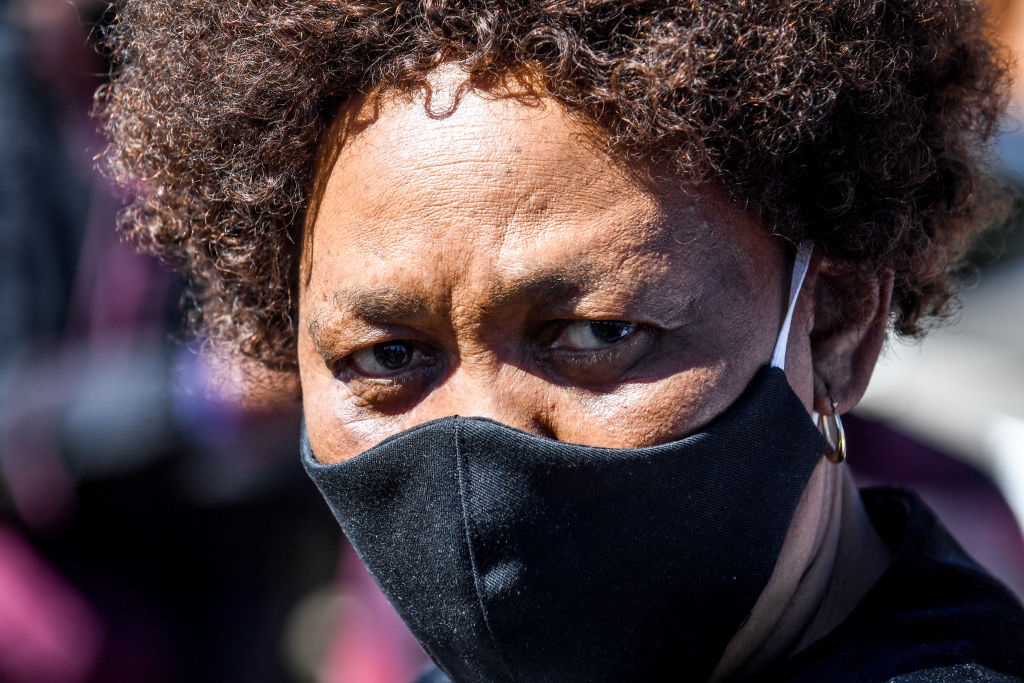


Minister of Basic Education Angie Motshekga during a visit to Seshegong Secondary School in Gauteng to check readiness for the reopening of schools. (Sydney Seshibedi/Gallo Images via Getty Images)
Basic Education Minister Angie Motshekga says reports given to her department indicate that schools across the country are on different levels of readiness, leading to her decision to postpone the return of pupils to schools until next week.
At a briefing in Rustenburg on Monday, Motshekga explained that reports from the National Education Collaboration Trust (NECT), Rand Water and heads of departments all gave an idea on where schools were at with the phased reopening.
READ | Here’s why the govt backtracked on reopening schools
But it gave a negative outlook and the Council of Education Ministers (CEM) decided to that the sector needed more time to “mop out” and prepare.
PPE and sanitation
From the beginning, the delivery of PPEs and the issue of water and sanitation posed a challenge. Motshekga has given provinces this week to finalise these issues, including the cleaning of schools.
She said that schools which had already received their PPE delivery could welcome back their teachers, who were expected to work from Monday.
PPEs still needs to be delivered
Godwin Khosa, CEO of the National Education Collaboration Trust (NECT), which has undertaken the monitoring of the readiness of schools, said most schools had procured and distributed their PPEs.
A snapshot from 27 May until 31 May indicated, however, that these schools had only started distributing to teachers, and not yet learners.
This was from data sourced regarding when each province procured their materials, where these processes were, when provinces had started distributing, and whether the distributed number of PPEs was sufficient.
READ | ‘Astounding confusion’: Unions criticise DBE on schools not reopening
Khosa said some provinces were still procuring certain items and that there were shortages of stock, particularly of cloth masks, in the market.
He said some suppliers had misrepresented their abilities to supply the PPEs, while other issues – such as protests – had hindered their delivery.
The data gathered indicated that two provinces – Gauteng and the Western Cape – were at a low risk and largely ready to reopen their schools.
Four provinces were identified as medium risk – Northern Cape, Free State, North West and Eastern Cape.
Three provinces were marked as high risk and with a low readiness – Limpopo, Mpumalanga and KwaZulu-Natal.
The NECT advised that the department should consider having a partial or delayed reopening of schools, depending on which provinces met readiness requirements.
Schools which did not meet requirements, should be closed until they did so.
Schools need water and sanitation
Teboho Joala, general manager of stakeholder relations at Rand Water, said their intervention would only reach six of the nine provinces, as Gauteng, Northern Cape and Western Cape had dealt with the requirements of establishing a water supply system on school premises.
Joala said 3 126 schools had been affected by this in the other six provinces and that 2 634 schools did not have water tanks or another supply of water.
In the Eastern Cape, 756 schools needed assistance in this regard, in the Free State this number was 87, KwaZulu Natal 1 125, Limpopo 475, North West 248, and Mpumalanga was at 435.
Teachers and support staff need to be trained
Motshekga said teachers and support staff needed to undergo orientation regarding the “new environment brought about by the Covid-19”.
They would then need to pass this on to learners.
TAKE PART | Answer News24’s Covid-19 survey and stand a chance to win R5000
Screeners, cleaners and volunteers for the national school nutrition programme (NSNP) also needed to undergo training.
Independent schools, small schools and special schools would have to manage these processes with their own representatives, Motshekga said.
“Based on their reports and that presented by HEDCOM (Heads of Education Departments Committee), I am hopeful that all outstanding challenges they unearthed will be addressed; and we can be able to have effective learning and teaching from 8 June 2020.”

